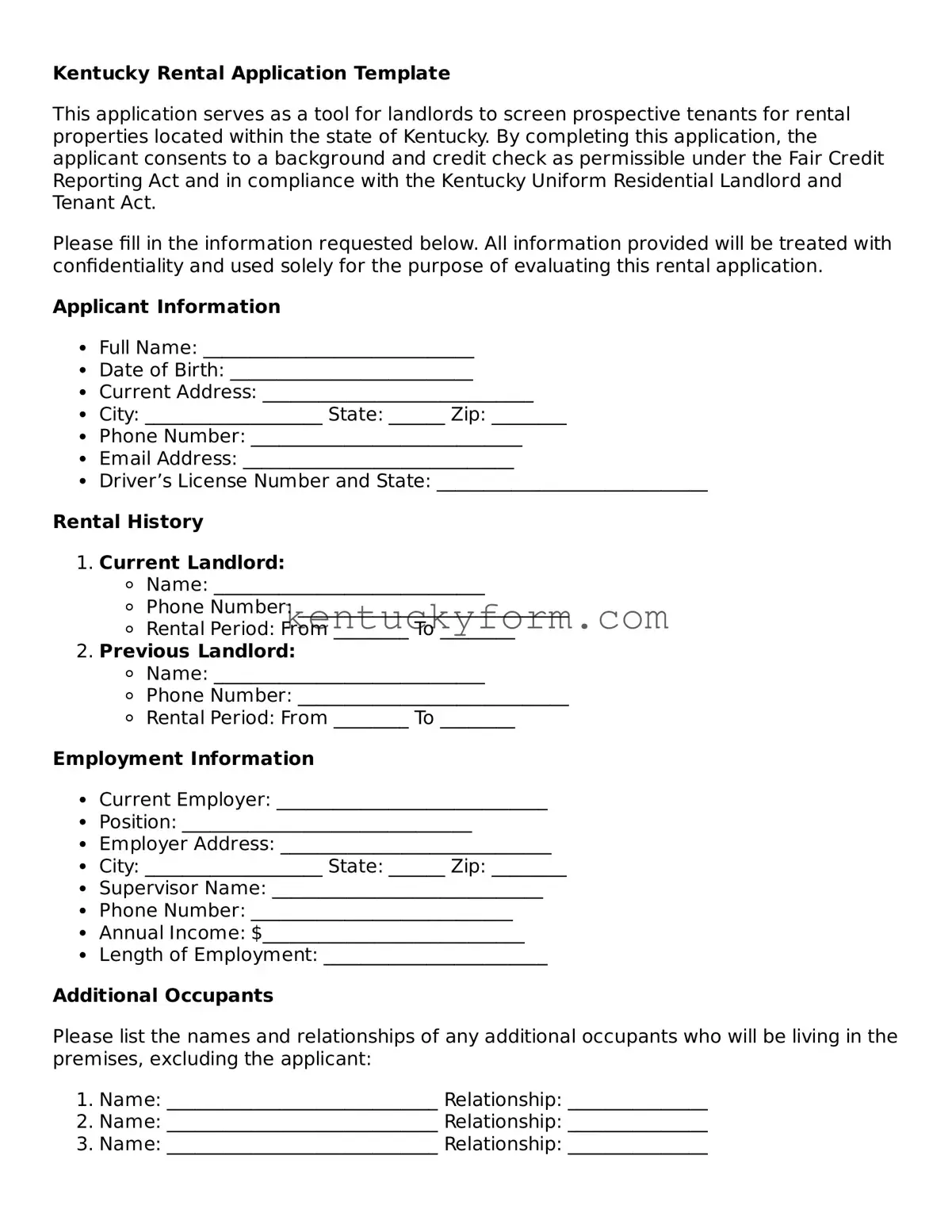The Kentucky Rental Application form shares similarities with the Residential Lease Agreement, as both serve pivotal roles in the leasing process. The Rental Application is generally the first step, allowing landlords to assess the suitability of potential tenants, whereas the Lease Agreement legally binds the landlord and the tenant to the agreed terms of the rental. Both documents contain detailed personal information about the tenants, including employment history and monthly income, to ensure reliability and capability to meet rental obligations.
Similar to the Employer Verification Form, the Kentucky Rental Application form seeks to verify an applicant's employment status and income. While the Employer Verification Form is filled out by an employer to confirm an employee's financial stability and job security, the Rental Application also requests these details as part of a broader assessment of the applicant's eligibility for tenancy. Both forms are essential for landlords to gauge financial reliability.
The Credit Report Authorization form and the Kentucky Rental Application form overlap significantly in function. Applicants consent to credit checks through both documents, permitting landlords or agents to investigate their credit history as part of the assessment process. The major difference is that the Credit Report Authorization is specifically tailored to authorize this financial scrutiny, whereas the Rental Application incorporates it among various other background checks.
Functionally akin to the Co-Signer Agreement, the Kentucky Rental Application form can include information pertinent to a co-signer. A Co-Signer Agreement is used when a tenant may not meet the financial requirements on their own and a third party agrees to be responsible if the tenant fails to pay rent. The Rental Application may gather details on this co-signer to initially gauge the combined financial strength of the tenant and any additional guarantors.
Comparable to the Reference Check Consent Form, the Kentucky Rental Application form often seeks an applicant's permission to contact personal and previous rental references. This similarity lies in the pursuit of validating the character and reliability of the applicant. However, the Reference Check Consent Form is dedicated solely to obtaining authorization to perform these checks, while the Rental Application covers this in a broader scope of vetting potential tenants.
The Pet Agreement form intersects with the Kentucky Rental Application form when the latter inquires about pets. Both documents address the terms under which pets are allowed on the property. The Rental Application may ask for pet information to assess suitability and potential additional fees or deposits, whereas the Pet Agreement specifically outlines the conditions and rules governing the presence of pets in the rental unit.
The Guarantor Form, much like sections of the Kentucky Rental Application form that may pertain to a co-signer or guarantor, is designed to provide a safety net for landlords. It legally binds a third party to cover the rent if the tenant fails to pay, ensuring financial security. While the Guarantor Form explicitly establishes this agreement, the Rental Application might preliminarily collect guarantor information to support the tenant's application.
The Condition of Rental Property Checklist and the Kentucky Rental Application form are related through the broader context of rental agreements. The former is utilized during move-in (and sometimes move-out) to document the state of the property, protecting both tenant and landlord interests. Although not directly involved in assessing property condition, the Rental Application indirectly sets the stage for this inspection by initiating the vetting process that leads to tenancy.
Last but not least, the Eviction History Report shares a connection with the Kentucky Rental Application form as they both address a potential tenant's rental background. While the Rental Application might include questions regarding past evictions to assess risk, the Eviction History Report provides a detailed record of any legal evictions, offering a comprehensive view of an applicant's rental reliability and behavior.

